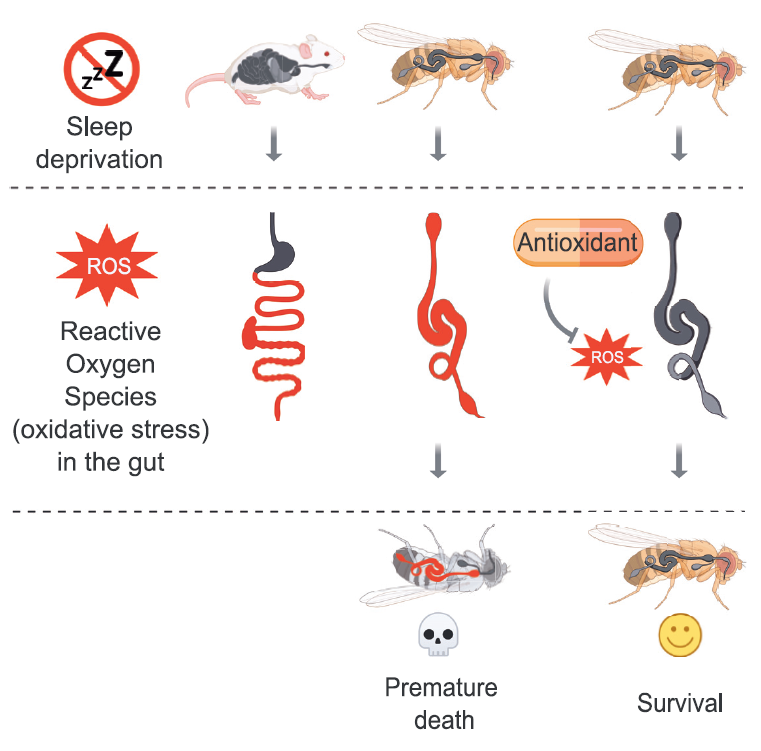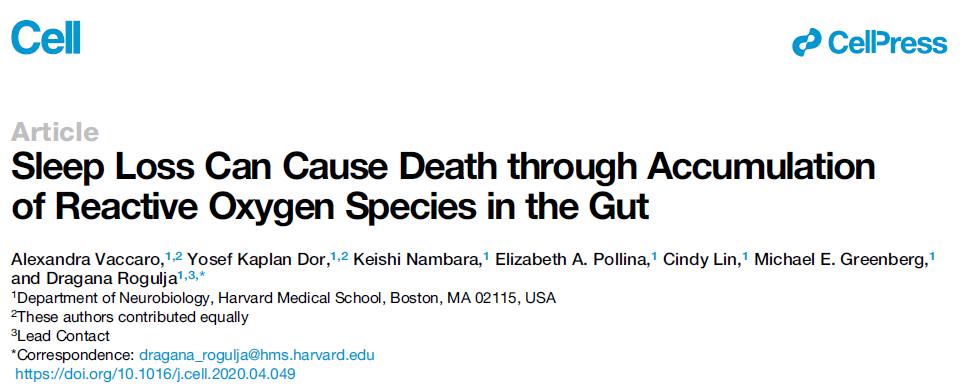Wronged the brain and heart?
Editor’s note: This article is from the micro-channel public number “academic headlines” (ID: SciTouTiao) , author: academic Jun.
Staying up late is a status quo in modern society. Due to the influence of a series of factors, such as the change of modern lifestyle and increasing pressure of social competition, staying up late has become the new normal of people .
However, we all know that staying up all night can cause great harm to our body, for example, staying up late can cause immune disorders, rough skin, and circadian body clock disorder It can also cause neurasthenia, headache and insomnia, and more seriously, a long-term stay up all night can also cause sudden death.
Why stay up late and cause death? Is there any good way to make up for the harm of lack of sleep?
On June 4, the research team led by Professor Dragana Rogulja of Harvard Medical School published the heavy research results in the world’s top journal Cell. The reason why staying up late can cause premature death is due to the accumulation of oxides in the intestine, and the researchers further confirmed through experiments that by actively removing the oxides in the intestines of animals, even if staying up late for a long time, their life expectancy and normal rest There is no difference in animals.
Professor Dragana Rogulja said, “Our research revealed for the first time the cause of premature death of animals due to insufficient sleep, which opens up new research avenues for us to understand the full consequences of insufficient sleep, and in the future will also offset The damage to the human body provides ideas.”
A core question about sleep
Sleep is the foundation of our human and animal life activities. Scientists have been studying sleep for a long time, trying to understand the mysteries of sleep, but there are still many secrets that cannot be solved.
Sleep is necessary for almost all animals currently known, if there is not enough sleepSleeping can cause a series of serious consequences. In humans, the effects of sleep loss are manifested in chronic sleep disorders, heart disease, type 2 diabetes, cancer, obesity, depression and other diseases.
In addition, as early as 1983, a Chicago scholar found that long-term sleep deprivation will inevitably cause animal death through research on rats. Afterwards, scientists have been exploring for decades, but one of the core problems remains unresolved, which is why animals die if they don’t sleep.
The brain is not the key, but the intestine is
Although previous studies have proved that prolonged sleep suppression will inevitably lead to premature animal death, in order to find the mechanism behind the death caused by sleep deprivation, most researchers have focused on the brain. After all, the brain is the main organ that controls our sleep. However, based on the study of the brain, no researcher has found useful clues.
Dragana Rogulja, a professor of neurobiology from Harvard Medical School, has long been devoted to the study of sleep deprivation. In order to find the cause of death of animals without sleeping, they selected fruit flies as experimental subjects. Because the genes of Drosophila are very similar to humans, many sleep regulation genes are shared with humans; at the same time, the life cycle of Drosophila is short, which is also suitable for researchers to observe.
Since the fruit fly can fall asleep even during the vibration of its wings, the researchers genetically regulated the specific nerve of the fruit fly to express a heat-sensitive protein. When the fruit fly was placed at 29 degrees Celsius This protein can always keep neurons active, thereby inhibiting the sleep of fruit flies. Subsequently, the researchers found that after about 10 days of sleep deprivation, the mortality of Drosophila reached its peak, and after 20 days, all the deprived fruit flies died, but the control group of fruit flies that stayed normal can survive for 40 days.
That is to say, sleep deprivation does cause premature death of fruit flies. So why do sleep-deprived fruit flies cause death? Since the mortality of Drosophila reached its peak from around the 10th day, the researchersAnd the days before to find the difference between sleep-deprived fruit flies and normal control fruit flies.
However, as in previous studies, no matter whether it is sleep deprived or normal fruit flies, their brains and most other tissues of the body have not changed significantly. In other words, the brain is not the organ that causes the death of fruit flies.
Sleep-deprived fruit flies gradually increase intestinal ROS levels on days 1, 7, and 10 (above); recovery Sleeping Drosophila gradually reduced intestinal ROS levels on days 5, 10, and 15 (below)
Finally, in the course of the research, the researchers still found an obvious difference between the two, that is, a large number of oxides accumulated in the intestines of sleep-deprived fruit flies, these oxides are highly reactive oxygen molecules, They will destroy a lot of DNA and other components in the cell.
At the same time, the researchers also confirmed that the accumulation of oxides is directly proportional to the mortality of Drosophila. It also peaked around day 10, and after stopping sleep deprivation, the level of active oxides in the intestines of Drosophila will also decrease. Subsequently, the researchers repeated this experiment in mice, further proving that only animals with sustained sleep deprivation can accumulate active oxides, which can induce animal death.
Neutralizing oxides can offset the harm of lack of sleep
Since animals with continuous sleep deprivation accumulate active oxides and induce premature animal death, can artificial removal or neutralization of these oxides prolong animal life?
For this reason, researchers have found dozens of antioxidants. These compounds can not only neutralize active oxides, but also can be used as food supplements, such as melatonin and NAD. By supplementing these antioxidants with fruit flies, the researchers found that sleep-deprived fruit flies have normal or near normal life spans after using antioxidant supplements. At the same time, normal fruit flies supplement these substances and their life spans No change.
That is to say, these antioxidants can prolong the life of sleep deprived fruit flies without any other effects. 
This further proves that the accumulation of active oxides in the intestine plays a central role in death from sleep deprivation. However, researchers have not been able to figure out why lack of sleep can lead to accumulation of active oxides in the intestine, and why it is so fatal. Professor Dragana Rogulja said, “Many of us have long-term lack of sleep, even if we know that staying up late is harmful.
At present, we have solved a core problem, that is, the biological mechanism of insufficient sleep that damages the human lifespan, and this discovery can at least achieve the effect of not sleeping or dying for fruit flies. “
Source: https://doi.org/10.1016/j.cell.2020.04.049https://www.eurekalert.org/pub_releases/2020-06 /hms-sda060120.php



